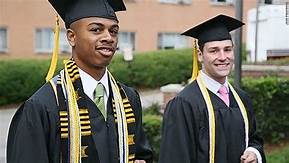Blog 14: Forgiveness

Good News
Upon our return from a two week trip to the Midwest, Jeny and I attended a volleyball game. The game was very difficult for me to watch. I worked with the team for the last several years and know the young women.
On one hand I rooted for them. On the other hand, two played a role in getting the previous coach fired. Since I viewed the firing as unfair, I was having a hard time forgiving them. It did not help, when administrators who played roles in the firing were also present. My ability to forgive was severely tested; (more on forgiveness later)
The good news happened when I observed the crowd. A traditional fraternity was in attendance and cheering for our team. Three of the members of an historically all- white fraternity were black males. I was very happy to see the integration of one of the longest standing traditions in the deepest South. I could see progress!!

Bad News
Vestiges of a racist past were seen this week in Virginia. A law suit was filed against the requirement to declare race on an application for a marriage certificate. You cannot get a certificate, unless you identify your race. The requirement is from the past years when interracial marriages were unlawful. I hope the suit is successful and the requirement removed.
Worse News
Even worse news came this week from a racist present. The owners of a wedding venue refused to allow an interracial marriage. The person in charge made the argument that mixing races was against her Christian religion.
The misguided and wrong stance is newsworthy. The news story painted a picture of a very backward person. The person is a Christian in Mississippi and fits some stereotypes for Christians and for someone from Mississippi.
I understand the approach to paint someone as backward. The approach makes readers and writers feel better than others. The approach sells papers.
In no way do I think the people at the venue were correct in their refusal but as Paul Harvey liked to say—now for the rest of the story.

The Rest of the Story
The owner of the event venue investigated her beliefs and discovered she was wrong. She admitted her mistake and apologized.
The story stopped there. I could not find a follow up article. Did the owner, truly accept her mistake and change her heart and behavior?
My challenge—should I forgive the person? She should have known better. Should I rejoice for a changed heart and mind? The after-story is not important to a newspaper but seems very important to me.
Forgiveness is a very tough topic for me when taken seriously. The only part of the Lord’s Prayer Jesus expands is our need to forgive others. To me, some of the toughest words in the Bible are—“if you do not forgive others, your Father will not forgive your sins” (Mathew 6:15).
I disagree with the players and administrators who fired my friend, but I am to forgive. I disagree with refusing an interracial wedding, but I am to forgive—especially a changed heart and mind.
I do not see enough forgiveness in our world today. People want revenge, a pound of flesh, imprisonment, law suits for damages, and some even go so far as to shoot in revenge for wrongs committed against them. I would like to see more examples of people realizing and admitting their mistakes and forgiveness being celebrated. Our leaders will not admit mistakes, our corporations will not admit mistakes, and individuals will not admit mistakes, in part because of the lack of forgiveness in our world. We need more forgiveness and reconciliation.
I find it very easy to forgive people I care about and who care about me. I find it extremely difficult to forgive people I do not like.
I am going to try to improve my forgiveness — in relationships with family and friends, in the big issues, with enemies and with people who have wronged me.
Let me know your experiences with forgiveness—I would love to hear them.
Responses
I received several thoughtful responses this week. I would like to highlight three.
Privilege. The first response highlights the importance of dialog. A friend expressed discomfort with my use of the word — privilege. To him privilege is something people feel they had earned. He disliked the pride implied by the word used in that way. He preferred to think of being blessed.
By sharing our views I was able to see why we differed. I was thinking of privilege as something unearned. I recognize unearned privileges occur in my life but I should not take pride in them.
I now try to distinguish between earned privileges and unearned privileges—neither of which do I find pride to be appropriate. I agree it is better to think of benefits as being blessed.
I will still use the word in important conversations. For example–my race brings some unearned privileges for me in certain situations. I do not seek unearned privilege, I do not condone unearned privilege, I do not take pride in unearned privilege, but I recognize it occurs.
I believe all races and types have unearned privileges under certain situations. I believe we are better off trying to understand when and where unearned privilege happens, than to try to deny it exists.
He created a thoughtful dialog. I learned from it. I am thankful to him.
A struggle: Another friend reported a conflict many people face—how to balance, sincere care for those lacking food and beds, with an awareness that some of the problems occur due to government enabling and bad personal decisions. Speaking from a close personal experience, the person has seen first-hand, how government policies enabled decisions which led to a free ride along with the avoidance of work and personal responsibility. The person wanted to acknowledge the problem without appearing insensitive to those in real need.
How to recognize the enabling issue while still caring is a real conflict. The person raised the issue in a thoughtful sensitive manner. His comments were not about pointing fingers at others. I believe the conflict is an important concern at both the government policy level and the level of our individual choices. We need dialog about the issue.
We face the conflict in our church’s back pack ministry. We send food for 15 students to a local school each weekend. The school distributes it to needy children. We used to send the food in backpacks. Often when the packs were returned on Monday they smelled of cigarettes and booze. The care givers had money for cigarettes and alcohol but not food for their children. We keep giving.
Context: Finally one friend cleverly combined two recent blogs. He reported how dramatically context affected him when he began to let his 15 year-old granddaughter drive to school. He accompanied her because she just had her learner’s permit. His prayers for his granddaughter (and him) to not be a part of the 40,000 who die each year in car accidents were increased and strengthened. His move from the driver’s side to the passenger side is a big, big change of context!
I had a good week.
I hope you did too.
Until next week,
Self-control,
Jerry
0 Comments